The bladder is a hollow organ is a reservoir for urine collection. Is that organ in the pelvis, its structure is absolutely the same in both men and women. It receives urine via two ureters that go from the kidneys.
The bottom of the bladder proceeds the urethra, through which it is emptied from urine. The reduction is provided by the muscle layer of the body. The act of urination is provided by the regulation of the brain signals it receives due to excitation of receptors in the walls of the bladder.
Often there are complaints that pulls the bladder. This symptom may indicate a number of diseases as the reservoir for urine and other organs. The cause can also be a pathology of locomotor apparatus, diseases of the nervous system.
Given the many possible causes pulling pain, to clarify the reasons you need to consider their duration, the connection with any triggering factor, the constancy of pain.
A little bit about the differences of disease in men and women
Pain in the bladder is differences in origin of the male and female parts of the population. If pulling in the area of reservoir for urine in women with a high probability the reason lies in its inflammation.
In women, absence of pain can also be attributed to the fact that the channel for urination in women is much shorter than men, which causes the frequency of infections. When carrying a baby in the uterus presses on the bladder tank, there is a change of hormonal background, which greatly affects the frequency of cystitis.
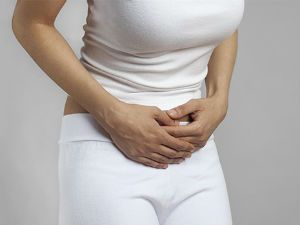
But in men it is a nagging pain can be associated with inflammation of the prostate gland. It is in close proximity to the bladder. And any increase in its volume causes the pressure on the latter. Most often it happens in the male population in old age, when the increase in the incidence of prostatitis and BPH.
What are the reasons?
Reasons for painful pulling sensations a lot, here are the most common:
- pathology of the bladder, urethra, ureteral system;
- pathological processes in the coccyx;
- kidney disease;
- of the disease by the prostate;
- problems in the organs of reproduction in women;
- neoplasms of the genitourinary system and the adjacent organs;
- neurological disease.
Only a qualified specialist can determine the exact cause of the pathological state
Inflammation
Perhaps the most frequent cause of pain is inflammatory reaction of the urinary reservoir, namely cystitis. Distinguish between infectious and noninfectious cystitis. The first is more common, it develops under the action of bacteria such as E. coli, staph and many others.
A triggering factor can lead to reduced immunity, low temperatures, gestation of the baby, poor personal hygiene, increased blood sugar, lack of exercise, irregular emptying of the reservoir for the urine, changes in climatic conditions. Distinguish chronic and acute process.
In addition to pulling pain, such a patient will pursue frequent urination, soreness and feeling of burning sensation during this process. Pain in women, cystitis will be after the act of urination.
Urethritis or inflammation of the channel for urination, too, is non-infectious and infectious nature. Among non-infectious causes include allergies, violation of outflow of urine, strictures of the urethra. Pain when the sharp, often want to urinate, men can be distant pain near the penis head. An important feature of urethritis is pain at the beginning of urination.
Kidney stones and bladder
Another reason of such symptoms may be kidney stones, the concretions appear as a result of disrupted mechanisms of exchange that cystitis is not connected. But the pain is aching, dragging color. It is intermittent, worsening is closely related to physical activity, heavy lifting, drive and transport.
The movement of stones along the urinary tract is characterized by a sharp pain. It starts usually in the lumbar region, and after moving to the sides of the abdomen. Characteristic of kidney stones is the sediment found in urine. Common symptoms of urine will be with blood, hypertensive syndrome, fever, pain after urination.
What to do if there are signs of the presence of stones in the kidneys or bladder? First of all, you must pass the examination with ultrasound can determine their localization, number and size. Further treatment depends on the size of the formation.
Small pebbles can bring therapeutic methods, but the stones more than 2 cm require surgery or advanced minimally invasive ways of crushing concrements.
Of glomerulo – and pyelonephritis
These two diseases tend to cause radiating pain in the region of the bladder. It happens most often pyelonephritis, in which the process of inflammation captures pan the renal pelvis and parenchyma of the organ. Infection in the kidney, in most cases, spreads from foci of chronic infection (teeth with caries, chronic tonsillitis, inflammation of the ovaries, prostate).
But the glomerulonephritis is immune-infectious nature of the process. Its main cause is hemolytic Streptococcus group A. the Characteristic feature of this pathology is urine color of meat slops a lot of bacteria in the urine.
Common features for these diseases is weakness, malaise, high body temperature, failure in the urine.
Prostatitis and prostate adenoma
In diseases of the prostate the main manifestation is pain with regularity. But not intense color. She gives in the crotch region, tormented by its consistency, which can disrupt sleep. In addition, the man is bothered by frequent urination, feeling of incomplete emptying.
Disease of the reproductive system in women
There are such pathological processes in women, such as inflammation of the peritoneum and tissue near the uterus, or perimetritis. Symptoms, in addition to pulling the pain will be as follows: fever, weakness, dry mouth.
For women, in addition to the cystitis, typical causes of pain are diseases of the sexual system. Stand out perimetritis (inflammation of the tissues of the peritoneum near the cervix) and tissue inflammation (around the uterus). Mainly the inflammatory reaction caused by pathogenic microorganisms.
Tumors
Dangerous are tumors in the bladder. They can be both malignant and benign. Most often pain of drawing nature manifests itself adenocarcinoma. The pain is in one place, is periodic in nature. In the urine blood.
Of the benign tumors often find a polyp. There are no specific symptoms.
Injury
Very rarely the cause of pain can be trauma, this requires a very strong punch that can be kept at a traffic accident. If there is injury to the bones in the pelvic area, urination is completely absent.
Pathology of the mucous layer
The so-called leukoplakia, which is the keratinization of epithelial cells in the bladder, can also cause pulling pain. It may be due to chronic inflammation occurring in the bladder, stones, some chemical agents. Person concerned about the constant urge to visit the Loo, discomfort during urination.
How to find out the cause of pulling pain?
When pulling pain, of course, need to first consult a specialist. This can be a General practitioner or directly to a urologist or nephrologist. The doctor will conduct a thorough survey will examine and prescribe the right research.
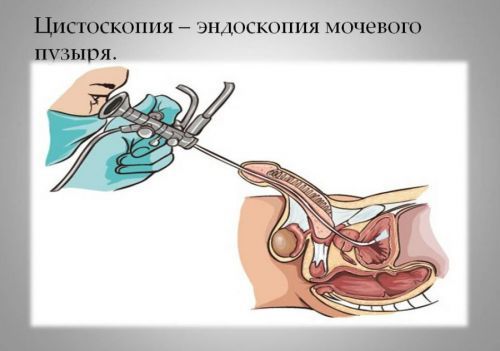
Usually it is the General analysis of blood and urine, biochemical analysis of blood. In some cases, you may need special tests such as urine on Nechiporenko and zimnitskiy. A routine examination will provide an opportunity to recognize the presence of inflammatory reactions in the body.
From the instrumental methods is mandatory ultrasound examination of the bladder, the whole of the pelvic organs. Also examined the kidneys. You may need a cystoscopy (required in the diagnosis of tumors). For suspected tumor is necessary x-ray contrast enhancement, a biopsy.
For women would be a mandatory thorough examination by a gynecologist for men digital examination of the prostate. In order to discover kidney stones, the doctor may prescribe excretory urography.
Therapeutic measures
Approach to treatment pulling pain depends on the cause. When talking about the inflammatory process in the bladder, then come to the aid of antibacterial agents (Monural, Zistan). Pyelonephritis drugs of choice are fluoroquinolones, protected penicillins, cephalosporins (Ceftriaxone, Amoxiclav). It is also important symptomatic treatment with nonsteroidal anti-inflammatory drugs (Nimesulide, Paracetamol).
Glomerulonephritis is treated with antibiotics, hormones (Prednisolone), cytotoxic agents, drugs that improve blood flow to the kidney (Chimes). Urolithiasis treatment approach depends on the size of the stones. Small stones (less than 2 cm) are derived with the help of drugs, but the big ones require surgical treatment.
Treatment of polyps is necessary only in the case that they interfere with the flow of urine, causing pain. Remove them under anesthesia using a cystoscope.
But malignant tumors require only surgical treatment, sometimes you need radiation therapy and medication.
Leukoplakia treatable with antibiotics, immunostimulatory drugs, hormone therapy, anti-inflammatory drugs. Perimetritis is subjected to antibiotics, hormones, immunomodulators, anti-inflammatory drugs.
Prostatitis are treated with alpha-blockers (Prazosin), antibiotics, herbal remedies. If conservative methods are inefficient conduct transurethral resection of the prostate. While adenocarcinoma is shown strictly surgical treatment. At later stages connect cytostatics and hormones. Dragging pain in the bladder is a reason to consult your doctor, do not self-medicate and take care of your health.

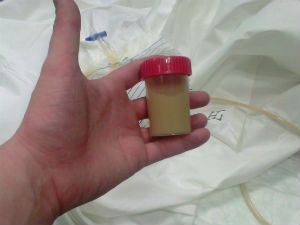
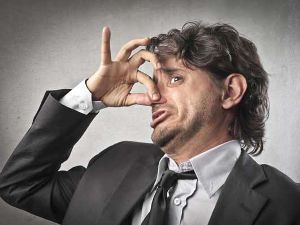
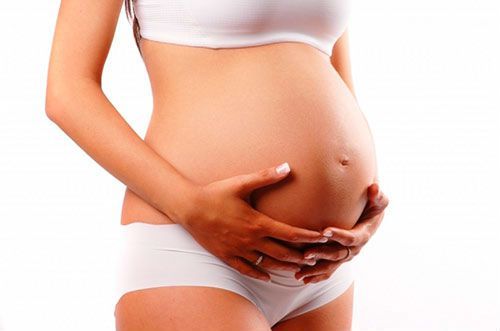
Hey there! I know this is kind of off topic but I was wondering which blog platform are you using for this site? I’m getting fed up of WordPress because I’ve had issues with hackers and I’m looking at alternatives for another platform. I would be fantastic if you could point me in the direction of a good platform.
I have not checked in here for a while as I thought it was getting boring, but the last few posts are great quality so I guess I抣l add you back to my everyday bloglist. You deserve it my friend 🙂